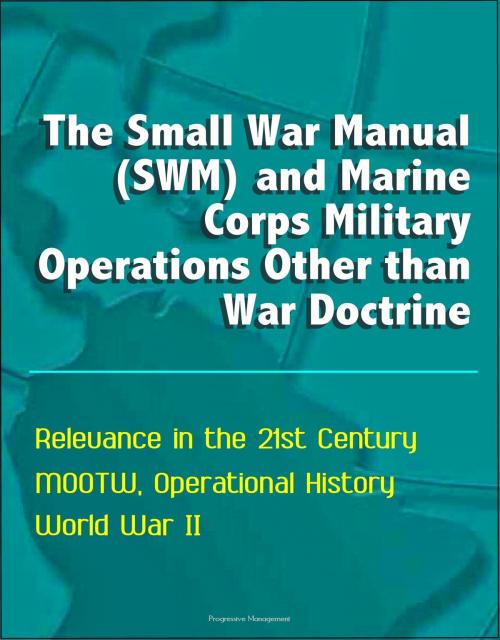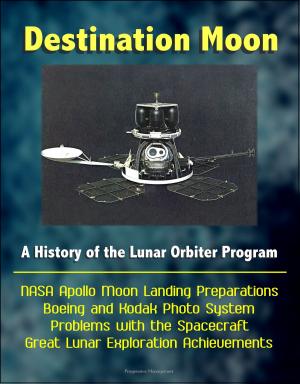The Small War Manual (SWM) and Marine Corps Military Operations Other than War Doctrine - Relevance in the 21st Century, MOOTW, Operational History, World War II
Nonfiction, History, Military, United States| Author: | Progressive Management | ISBN: | 9781311949226 |
| Publisher: | Progressive Management | Publication: | January 24, 2015 |
| Imprint: | Smashwords Edition | Language: | English |
| Author: | Progressive Management |
| ISBN: | 9781311949226 |
| Publisher: | Progressive Management |
| Publication: | January 24, 2015 |
| Imprint: | Smashwords Edition |
| Language: | English |
On 28 March 2001, the United States Marine Corps Warfighting Laboratory's embedded "think tank," the Center for Emerging Threats and Opportunities, announced its intentions for developing a follow-on volume of the Small Wars Manual. This Small Wars Volume II intends to serve as a reference publication despite that the original manual was authoritative doctrine and that current Military Operations Other Than War guidance is either in a "Concept in Development" or "Awaiting Development" status. Thus this thesis answers: Does the Small Wars Manual series present a relevant baseline for the United States Marine Corps (USMC) to further develop its future MOOTW doctrine? The following supporting questions require examination: (1) Why did the original SWM erode from serving as USMC MOOTW authoritative doctrine to that of general reference and historical material? (2) What does the SWM offer Twenty-first Century Marine Corps MOOTW doctrine? (3) What does the SWM Volume II intend to offer Twenty-first Century Marine Corps MOOTW doctrine? The thesis concludes, among other things, that indeed the SWM series deserves significant consideration for serving as Navy and Marine Corps authoritative MOOTW doctrine with the Small Wars Manual retaining its Marine Corps Reference Publication (MCRP) designation and its follow-on volume serving as a Navy and Marine Corps authoritative doctrinal.
CHAPTER 1 - INTRODUCTION * CHAPTER 2 - THE OPERATIONAL HISTORY OF THE SMALL WARS MANUAL * CHAPTER 3 - THE SMALL WARS MANUAL: TWENTY-FIRST CENTURY RELEVANCE CHECK * CHAPTER 4 - THE SMALL WARS MANUAL VOLUME II * CHAPTER 5 - CONCLUSION
The SWM is a USMC "pre-World War II booklet that provide[s] guidelines for the conduct of Military Operations Other than War (MOOTW)." It has been celebrated as "an unparalleled exposition of the theory of small wars." The SWM authors, veterans of the Caribbean and Central American "Banana Wars" (1901 to 1934), based their Manual upon "experiences in the early years of the twentieth century, and on a handbook that grew out of Britain's colonial experience." The handbook referenced is Colonel Charles Calwell's Small Wars, a warfighting classic that captures British MOOTW experiences accumulated over an entire era of colonial expansion. In 1987, the USMC reprinted the SWM, claiming it to be ". . . one of the best books on military operations in peacekeeping and counterinsurgency operations published before World War II." This claim is perhaps an understatement given the generic nature of currently available MOOTW doctrine. CETO's current SWM Volume II confronts the daunting task of modernizing Callwell's and the Banana War's doctrinal legacies.
Despite recent service in the Great War and with another global conflict looming on the horizon (World War II), the 1940 SWM authors declared that "Small Wars" represented "the normal and frequent operations of the Marine Corps." Similarly, at the turn of the Twenty-first Century, despite the I Marine Expeditionary Force's sustained operations ashore during Operations Desert Shield and Desert Storm (1990 to 1991) and in Operations Iraqi Freedom (2003to present), MCDP 3, Expeditionary Operations (1998) reminds Marines that small-scale contingencies remain "the most likely and most frequent crises into which the United States will find itself drawn." Given this emphasis, it is puzzling that Marines enter the Twenty-first Century without either an EMW OEO supporting concept for the future or service-specific MOOTW doctrine.
On 28 March 2001, the United States Marine Corps Warfighting Laboratory's embedded "think tank," the Center for Emerging Threats and Opportunities, announced its intentions for developing a follow-on volume of the Small Wars Manual. This Small Wars Volume II intends to serve as a reference publication despite that the original manual was authoritative doctrine and that current Military Operations Other Than War guidance is either in a "Concept in Development" or "Awaiting Development" status. Thus this thesis answers: Does the Small Wars Manual series present a relevant baseline for the United States Marine Corps (USMC) to further develop its future MOOTW doctrine? The following supporting questions require examination: (1) Why did the original SWM erode from serving as USMC MOOTW authoritative doctrine to that of general reference and historical material? (2) What does the SWM offer Twenty-first Century Marine Corps MOOTW doctrine? (3) What does the SWM Volume II intend to offer Twenty-first Century Marine Corps MOOTW doctrine? The thesis concludes, among other things, that indeed the SWM series deserves significant consideration for serving as Navy and Marine Corps authoritative MOOTW doctrine with the Small Wars Manual retaining its Marine Corps Reference Publication (MCRP) designation and its follow-on volume serving as a Navy and Marine Corps authoritative doctrinal.
CHAPTER 1 - INTRODUCTION * CHAPTER 2 - THE OPERATIONAL HISTORY OF THE SMALL WARS MANUAL * CHAPTER 3 - THE SMALL WARS MANUAL: TWENTY-FIRST CENTURY RELEVANCE CHECK * CHAPTER 4 - THE SMALL WARS MANUAL VOLUME II * CHAPTER 5 - CONCLUSION
The SWM is a USMC "pre-World War II booklet that provide[s] guidelines for the conduct of Military Operations Other than War (MOOTW)." It has been celebrated as "an unparalleled exposition of the theory of small wars." The SWM authors, veterans of the Caribbean and Central American "Banana Wars" (1901 to 1934), based their Manual upon "experiences in the early years of the twentieth century, and on a handbook that grew out of Britain's colonial experience." The handbook referenced is Colonel Charles Calwell's Small Wars, a warfighting classic that captures British MOOTW experiences accumulated over an entire era of colonial expansion. In 1987, the USMC reprinted the SWM, claiming it to be ". . . one of the best books on military operations in peacekeeping and counterinsurgency operations published before World War II." This claim is perhaps an understatement given the generic nature of currently available MOOTW doctrine. CETO's current SWM Volume II confronts the daunting task of modernizing Callwell's and the Banana War's doctrinal legacies.
Despite recent service in the Great War and with another global conflict looming on the horizon (World War II), the 1940 SWM authors declared that "Small Wars" represented "the normal and frequent operations of the Marine Corps." Similarly, at the turn of the Twenty-first Century, despite the I Marine Expeditionary Force's sustained operations ashore during Operations Desert Shield and Desert Storm (1990 to 1991) and in Operations Iraqi Freedom (2003to present), MCDP 3, Expeditionary Operations (1998) reminds Marines that small-scale contingencies remain "the most likely and most frequent crises into which the United States will find itself drawn." Given this emphasis, it is puzzling that Marines enter the Twenty-first Century without either an EMW OEO supporting concept for the future or service-specific MOOTW doctrine.















